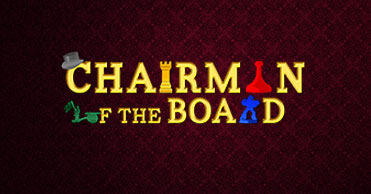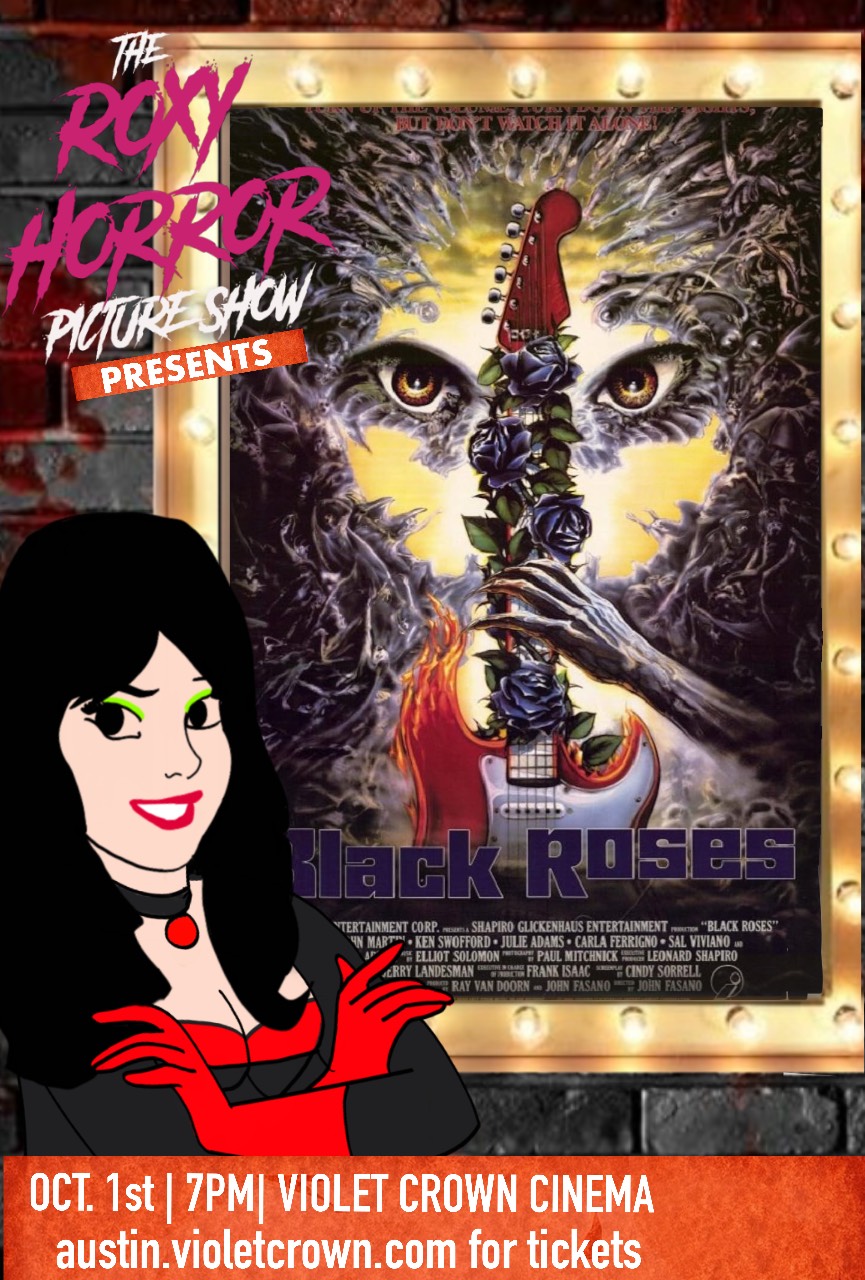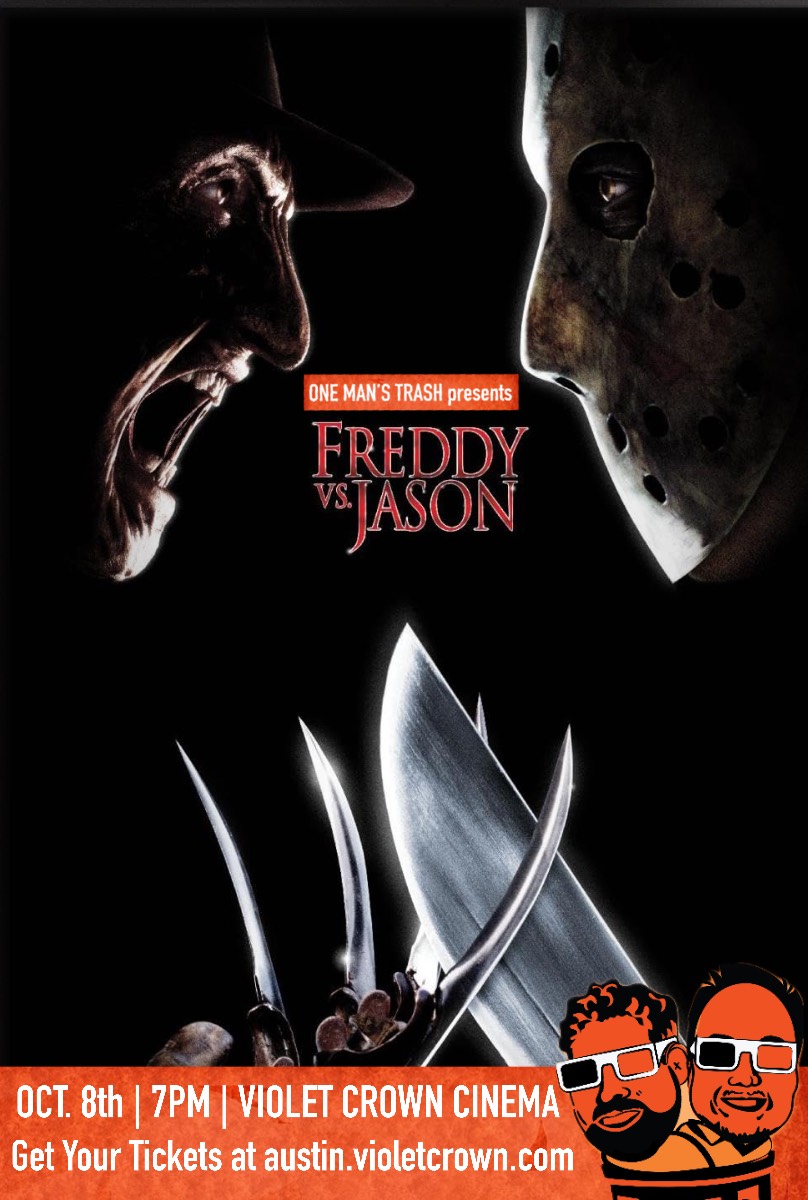Zombies are everywhere and there’s nothing we can do to stop them.
Of course, by zombies, I mean “shows, movies, games and a paraphernalia related to the flesh-munching undead.” What was once a niche horror subgenre has become commonplace. The success of The Walking Dead has has pulled zombies kicking and screaming into the mainstream. Films like World War Z have given the traditionally genre an expensive blockbuster makeover. Zombies are everywhere. Yes, they’re even in board games.
If you want to join me up on a high horse, zombies actually feel more at home on your table than on AMC. At one time, the walking dead appealed to horror geeks and horror geeks alone, so it makes sense that this subject would be the peanut butter to tabletop gaming’s chocolate. Sure, there are bunch of posers who say they love zombies and have seen every episode of The Walking Dead, but folks like you and me can make Fulci references while killing armies of zombies on our kitchen tables with Goblin’s greatest hits blasting in the background.
Okay. Now that we’ve proven how much hipper and cooler we are than everyone else in the world, let’s get down to brass tacks and talk about some zombie board games. Specifically, let’s talk about the three best zombie board games, the cream of the crop in a stupidly saturated market.
The great joy of the zombie genre has always been its versatility. Zombie movies are rarely actually about the undead, using hordes of shambling corpses as an excuse to examine humanity at its worst and best. Similarly, zombie board games tend to use this eye-catching theme to play with varied mechanics. Strip away the subject matter and you won’t find three more different games than Last Night on Earth, City of Horror and Zombicide. Sure, all of them see you dealing with a nasty zombie problem, but they all offer their own unique flavors and rewards.
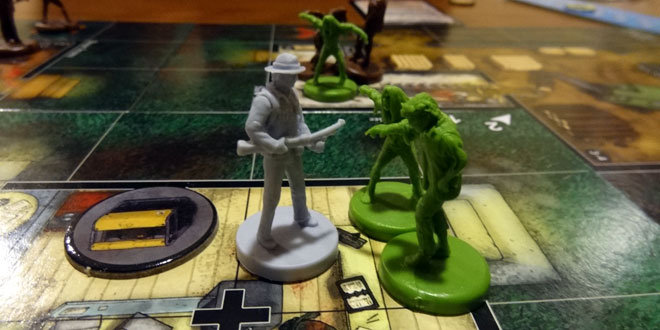
Last Night on Earth has been selling out at game shops since 2007 and for good reason: in addition to that ever-popular zombie theme, it’s insanely accessible and one of the first games newly minted gamers tend to pick up. Set in a small rural town (randomly constructed from modular tiles), the game splits the table into two teams: the humans and the zombies. Each human player controls an individual hero with unique benefits and barriers while the zombie player controls an entire horde of the undead. The players pick a scenario (escape town, kill twelve zombies, defend the mansion, etc) and then it’s off to the races, with both teams working to prevent the other from accomplishing their goals.
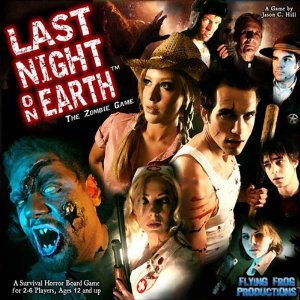 What’s truly special about Last Night on Earth is the instant playful antagonism it creates around the table. The hopelessly outnumbered human players have to work together or die quickly, so the result is an instant camaraderie. Plans and strategies are hatched, successful dice rolls are cheered, taunts are thrown at the zombie player and so on. But that zombie player, working alone but in control of a literal army, gets to plot in secret. Listening in on everything his delicious human opponents are saying, he can play the long game. Playing as a human and successfully killing a zombie is a good time, but playing as the zombies and watching your opponents slowly start to worry and panic as your horde cuts off their every escape is one of the most satisfying experiences you’ll ever have while gaming.
What’s truly special about Last Night on Earth is the instant playful antagonism it creates around the table. The hopelessly outnumbered human players have to work together or die quickly, so the result is an instant camaraderie. Plans and strategies are hatched, successful dice rolls are cheered, taunts are thrown at the zombie player and so on. But that zombie player, working alone but in control of a literal army, gets to plot in secret. Listening in on everything his delicious human opponents are saying, he can play the long game. Playing as a human and successfully killing a zombie is a good time, but playing as the zombies and watching your opponents slowly start to worry and panic as your horde cuts off their every escape is one of the most satisfying experiences you’ll ever have while gaming.
Although Last Night on Earth is a competitive game, it’s ultimately about cooperation, forcing people to band together if they want to survive. It makes you feel good about yourself and it builds bonds. You’ll never forget that time the Sheriff arrived in the nick of time to distract the zombies, allowing your buxom farm girl enough time to get to the truck and save the rest of the crew. Last Night on Earth is a truly cinematic experience, with the best games generating a story that feels like it was ripped out of a low budget horror movie. Even when you lose, it’s a game that’ll leave you happy and laughing and ready to try again with another scenario.
But what would happen if zombies really invaded your town? Would you band together, find a bunch of weapons and work together to destroy the horde? Or would you all cower in the few safe buildings, doing everything in your power to survive, even if it means turning off your soul and becoming a loathsome, despicable bastard? City of Horror is an cynical as Last Night on Earth is positive and it’s one of the most uncomfortable, gut-wrenching, friendship-wrecking games you’ll ever put on your table. It’s amazing, but it’s also the kind of game that can truly sour an evening if you play with the wrong group.
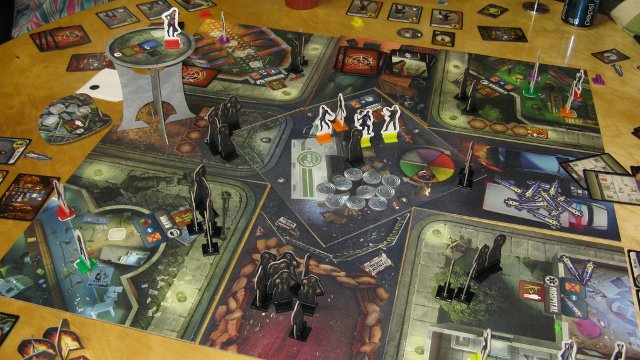
Like Last Night on Earth, City of Horror takes place in a small town under siege by zombies. Unlike Last Night on Earth, the zombies are controlled by the game itself, with each player taking control of a group of survivors. Your goal is simple: be the player to have the most survivors alive at the end of the game, when a military helicopter arrives to evacuate the town. The first thing you’ll notice during a round of City of Horror is that there’s rarely enough shelter for every character. There are almost no weapons and those that you do find are one-use only. The only way to keep your people alive is to be selfish and do nothing out of charity.
Example: zombies descend on the church and unless the survivors can kill a couple of them, they’ll be attacked. One player at the table has a molotov cocktail and can take care of the problem. But why should he? Why should he waste his valuable weapon to help someone else when his people need protection? The players in the church beg and plead, promising to give him cards and vaccines and future support if he’ll save their lives. And that’s what City of Horror is really about. It’s not about killing zombies, but about bargaining and manipulating everyone else at the table to further your interest. It’s a dark, soulless game that paints a grim picture of what people would actually do during a zombie invasion.
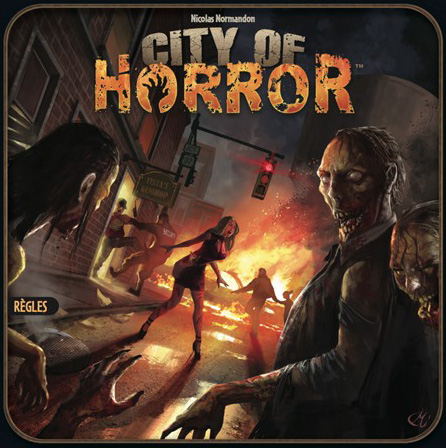 When zombies do invade a location and no one can defend themselves, there is only one thing to do: everyone present votes on which character they’re going to toss to the horde to keep them occupied while the rest escape. That’s right: the main gameplay mechanic of City of Horror is deciding which character you want to murder in order to keep your team alive. If you imagine this leading to grudges, bickering and petty vengeance, you’re imagining correctly.
When zombies do invade a location and no one can defend themselves, there is only one thing to do: everyone present votes on which character they’re going to toss to the horde to keep them occupied while the rest escape. That’s right: the main gameplay mechanic of City of Horror is deciding which character you want to murder in order to keep your team alive. If you imagine this leading to grudges, bickering and petty vengeance, you’re imagining correctly.
One game of City of Horror saw the group barricaded in the bank vote to toss the eight year old girl into the crowd of zombies outside. Another saw a priest use explosives to blow up the water tower and every character on it as revenge for their actions earlier in the game. My girlfriend, usually open minded and down for any game, refuses to go near City of Horror anymore. She speaks of it with venom in her voice. It’s a masterpiece of feel-bad gaming.
After the darkness of City of Horror, a game like Zombicide should come as a welcome change of pace. Although similar to Last Night on Earth upon first glance, it’s actually a very different experience, a “dungeon crawler” style game stripped down and given a coat of impressive zombie-themed paint. You’d be hard-pressed to find a better produced game than Zombicide, which costs $90 but earns it with gorgeous modular tiles, impressive figurines, fun art and a more zombie figurines than you could possibly imagine.
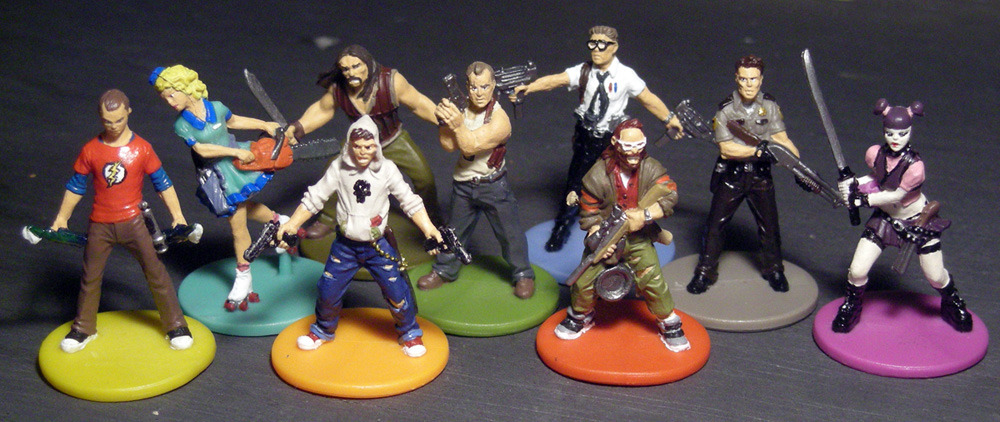
Zombicide is a fully cooperative game, with each player taking on an individual hero and a deck of increasingly nasty cards controlling the movement and spawning of the zombies. Depending on the scenario, the Zombicide board can range from tiny to massive, but the urban setting is a nice change of pace from the cramped small town feeling of Last Night on Earth and City of Horror. Trying to navigate an entire city crawling with the undead is a terrifying and stressful experience. Although it’s certainly possible to feel overwhelmed in other zombie games, Zombicide is the first to truly paint a seemingly insurmountable situation. When you realize that your battered troupe of survivors has to battle though six zombie-infested blocks and the game has the proper components to create that sense of scale, the feeling of dread is palpable.
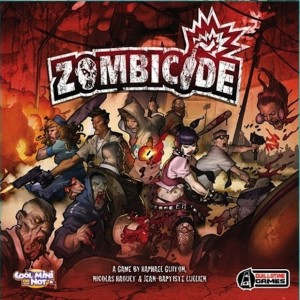 Although it’s the best game out there at actually making you feel like you’re stuck in the middle of a zombie infestation, Zombicide is also one of the simplest and most straightforward games you’ll ever bring to table (sometimes to a fault). Movement and combat are incredibly simple, so much of your focus will be on working together to survive instead of battling the rulebook. Although the odds are always against you, the game rewards teamwork and dramatic gestures, so laughter, cheering, exclamations of love and high five are par for the course in a Zombicide session. There is nothing in this game that’s as clever or radical as City of Horror’s voting system, but sometimes you just want a big bowl of buttery popcorn. This is the tabletop equivalent of a crowd-pleasing blockbuster — it’s simple, built to appeal to as many people as possible, totally accessible and leaves everyone pumped when the final zombie (or human) falls dead.
Although it’s the best game out there at actually making you feel like you’re stuck in the middle of a zombie infestation, Zombicide is also one of the simplest and most straightforward games you’ll ever bring to table (sometimes to a fault). Movement and combat are incredibly simple, so much of your focus will be on working together to survive instead of battling the rulebook. Although the odds are always against you, the game rewards teamwork and dramatic gestures, so laughter, cheering, exclamations of love and high five are par for the course in a Zombicide session. There is nothing in this game that’s as clever or radical as City of Horror’s voting system, but sometimes you just want a big bowl of buttery popcorn. This is the tabletop equivalent of a crowd-pleasing blockbuster — it’s simple, built to appeal to as many people as possible, totally accessible and leaves everyone pumped when the final zombie (or human) falls dead.
But which one of these games is the best? On some level, it’s unfair to compare them. Without the zombie theme, each of them operates on such a different level that it feels strange that they’re even connected at all. I’m partial to City of Horror’s unrelenting bleakness, but I also can’t get enough of Zombicide and its “kill as many zombies as possible while your teammates cheer on” approach to the genre. Last Night on Earth is probably the most well-rounded of the bunch, but it’s are leaves a lot to be desired — it’s not nearly as sexy to look at as the other two.
The simple recommendation is to buy ’em all since they’re all going to scratch different itches. If you’re new to gaming, Last Night on Earth is probably going to be your new favorite game for a few months. If you want something that’s actually going to challenge you (and doesn’t have any dice or random chance), City of Horror is the best kind of poison. Zombicide is going to make everyone happy, even thought it’s lacking any kind of actual depth.
In short, there’s no reason to pick up the licensed Walking Dead board game unless you hate yourself and enjoy bad things. Zombies may be everywhere, so it’s by default that they’ve invaded plenty of exceptional tabletop games.

